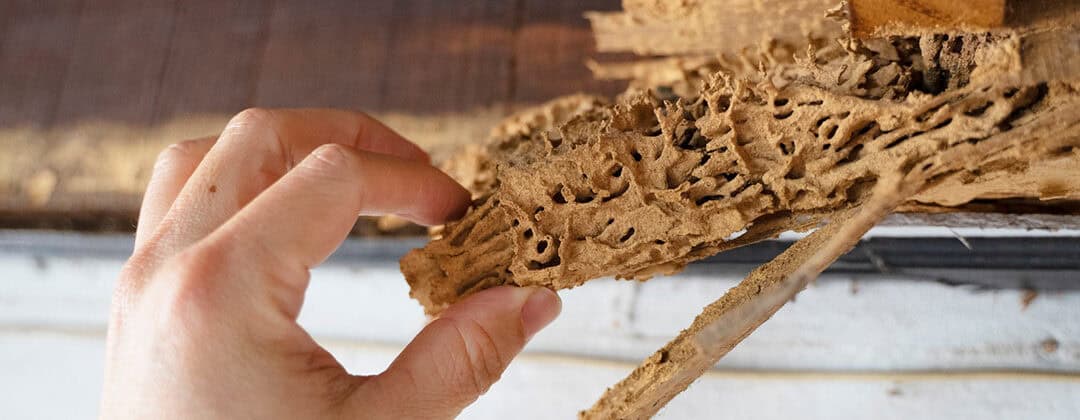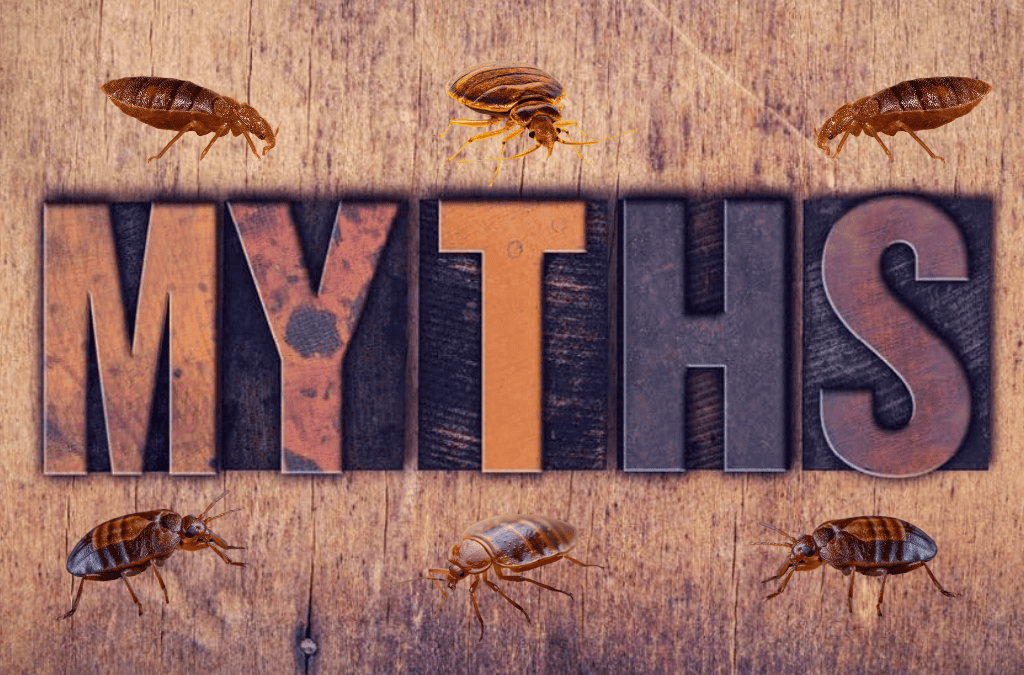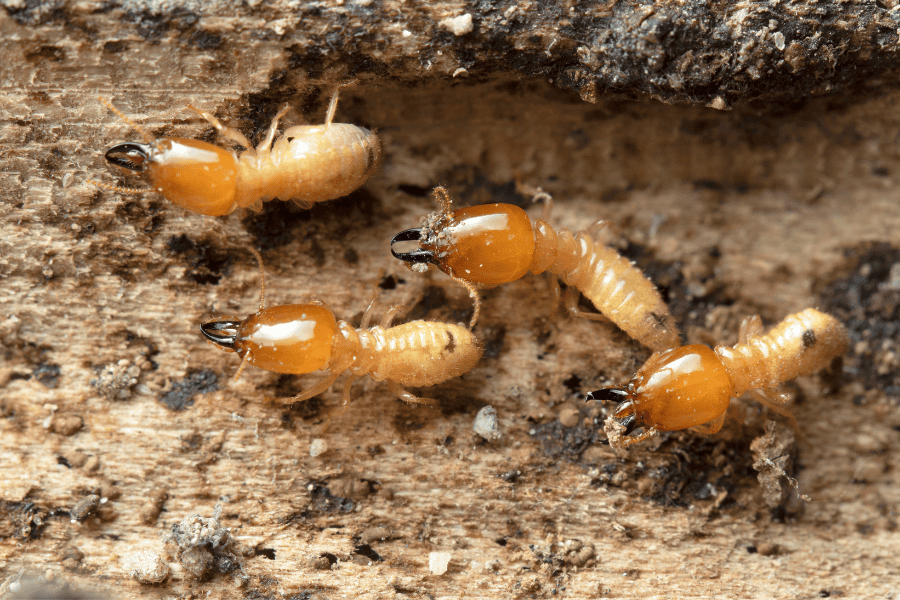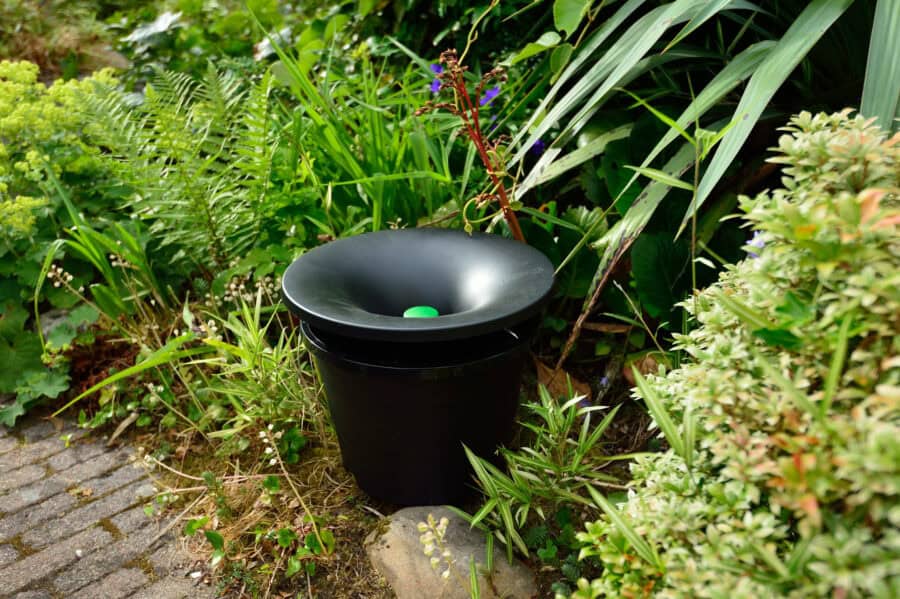READY TO GET STARTED?
REQUEST A FREE ESTIMATE
Fill out the form below or call (336) 226-1448 for a free, no-obligation estimate.

Termites cause billions of dollars in property damage across the United States annually, making them one of the most persistent challenges for homeowners. But in North Carolina, there’s a growing shift toward green pest control that emphasizes sustainable, effective methods for managing termites without compromising the environment.
Whether you’re a homeowner concerned about protecting your investment or an eco-conscious individual looking for termite solutions that align with your values, this guide offers valuable insights into North Carolina’s approach to addressing termite infestations.
Homeowners in North Carolina are becoming increasingly vigilant, recognizing the importance of early detection. Waiting to act typically allows termite colonies to grow, leading to extensive damage to your home’s structure. These insects are often discreet, operating out of sight and under the radar, which means catching them early can save you stress and costly repairs.
Wondering what signs to look for? Here are some of the key indicators of termite presence in your home or on your property:
Regular inspections by pest control professionals can be invaluable in catching these signs before significant issues arise.
There’s a saying in the pest control industry that prevention is better than intervention. While dealing with an infestation can be challenging, North Carolina’s homeowners are increasingly opting for proactive measures that reduce the likelihood of termites becoming a problem in the first place.
Property owners are turning to soil barrier treatments as a way to discourage termites from entering homes. These treatments involve establishing a physical or chemical layer in the soil surrounding your property, making it challenging for termites to gain access to wooden structures.
One eco-conscious solution homeowners can rely on is Sentricon. This innovative termite baiting system is attractive to termites leading to an easy position of eliminating the colony without harmful chemicals, making it a less-toxic and effective option for those looking to protect their homes sustainably.
Another trend sweeping North Carolina is investing in regular termite inspections. Scheduling an annual or semi-annual inspection can help homeowners catch signs of termite activity early. Professionals specializing in green pest control use techniques that allow them to thoroughly assess your property without resorting to invasive or environmentally harmful measures.
Some companies in the area even offer integrated pest management (IPM) services, a forward-thinking strategy that evaluates your home’s unique environment to develop targeted, sustainable approaches to termite prevention or control.
Moisture and termites go hand in hand, as damp conditions create the perfect environment for colonies to thrive. North Carolina’s humid climate can exacerbate this problem, so sustainable pest control strategies often focus on moisture management. Addressing leaky pipes, clogged gutters, or poor drainage can act as a natural deterrent to termites, minimizing the conditions they rely on to survive.
Choosing green pest control solutions offers dual benefits for homeowners in North Carolina. Beyond protecting your property, these methods prioritize environmental health and sustainability. Here’s how they work:
By making eco-friendly decisions, you contribute to healthier ecosystems across North Carolina while protecting your home from potential structural damage.
North Carolina homeowners are leading the way in adopting green pest control practices that prioritize their homes, health, and the environment. Through early detection and preventive measures like soil barriers, inspections, and moisture management, it’s possible to stay ahead of potential termite issues while staying true to eco-conscious values.
If you’ve noticed signs of termites or want to discuss sustainable preventive measures for your home, now is the time to act. Reach out to trusted pest control professionals in your area to keep your property protected.

Bed bugs are often misunderstood, and unfortunately, many of the myths surrounding them can lead to confusion and improper management. For residents of North Carolina navigating pest control understanding the realities of bed bug behavior, prevention, and solutions is key to maintaining peace of mind in your home. This guide to bed bug control near me will break down common misconceptions about bed bugs and provide the clarity needed to understand how to best address them.
One of the most persistent myths about bed bugs is that they are drawn to dirt and unsanitary conditions. The truth? Bed bugs are not discriminating. What they are actually seeking is a food source, which primarily comes from human activity.
Whether your home is impeccably clean or cluttered, bed bugs can find their way in. They hitch rides on luggage, second-hand furniture, clothing, and even electronics, making anyone susceptible. For homeowners in North Carolina, being proactive when returning home from travel or shopping for used goods is essential to keeping these pests at bay. Regularly inspecting these items can reduce the risk of unknowingly introducing bed bugs into your home.
Walking into a hardware store and grabbing the first pest spray on the shelf can be tempting when faced with a bed bug issue. However, bed bugs are notoriously hardy and resistant to many common pesticides. Over-the-counter sprays often address only surface-level infestations, leaving eggs hidden in cracks and crevices untouched.
Additionally, DIY approaches can sometimes worsen the problem by dispersing bed bugs to other parts of your home. Seeking professional pest control services in North Carolina ensures that the issue is addressed comprehensively with techniques specifically designed to manage infestations effectively.
Don’t let the name fool you. Though they commonly live in mattresses and box springs, bed bugs are known to inhabit a variety of spaces. From couches and carpets to baseboards and electrical outlets, they are experts at hiding in any place where humans spend extended amounts of time.
For North Carolina homeowners, this means thorough inspections are crucial. Instead of focusing solely on your bed, examine furniture, rugs, and even cracks in your walls for signs of these pests. If you spot their small rust-colored spots or witness live bugs, consult a professional immediately to evaluate the full extent of the issue.
Unlike other pests, such as mosquitoes or ticks, bed bugs are not known to transmit diseases. While their bites can cause itching and discomfort, they are not a direct health hazard in terms of spreading illnesses. Instead, the primary concern tends to be psychological stress and disrupted sleep for homeowners dealing with an infestation.
To ease the mental burden, North Carolina residents can focus on preventative strategies to reduce the likelihood of encountering bed bugs. These include using mattress encasements, vacuuming frequently, and carefully inspecting luggage after traveling.
Extreme temperatures are often highlighted as an effective method for dealing with bed bugs. While heat and cold treatments do work under the right conditions, achieving the precise temperatures necessary to impact all life stages of bed bugs (including eggs) can be difficult on your own. Bed bugs are adept at finding protected hiding spots, making it challenging to expose them fully to these conditions.
Licensed pest control experts use specialized equipment to apply targeted heat or cold treatments when appropriate, ensuring that the intervention reaches every corner where bed bugs may be hiding. Avoid relying on home remedies like leaving infested items outside during a North Carolina winter, as these methods often fail to deliver complete results.
One of the more damaging misconceptions about bed bugs is the assumption that they indicate a lack of cleanliness. This belief creates shame and delays individuals from seeking help when they need it most.
Bed bugs thrive in locations where people spend extended periods of time, regardless of how clean or organized the environment is. For North Carolina residents, understanding that these pests are not a hygiene issue can help empower the decision to take swift action without judgment or hesitation.
Now that we’ve addressed the common myths surrounding bed bugs, the next step is to take preventative and responsive measures to protect your home. Armed with accurate knowledge, North Carolina homeowners can better manage these pests and ensure a pest-free environment.
If you’re unsure about how to proceed, consulting with a local pest control provider ensures you receive expert guidance tailored to your specific needs. Whether you want peace of mind or comprehensive assistance with an active infestation, working with bed bug control near me will provide the thorough solutions you’re looking for.

Termites may be small, but the damage they can cause to your home is anything but. With warmer weather in spring and summer, these pests become more active, particularly in places like North Carolina where the climate is ideal for their colonies to thrive. Protecting your home from termites is essential to maintaining its structural integrity and avoiding costly repairs. This comprehensive guide to termite control near me will walk you through what you need to know about termites, how to identify early warning signs, and practical steps to keep them at bay this season.
Termites are wood-eating insects that live in colonies and can chew through wooden structures, flooring, and even wallpaper. The most common types in North Carolina are subterranean termites, which thrive in moist environments and can silently damage your property. Unlike other pests, termites don’t just infest; they destroy.
What makes them particularly challenging is that their activity often goes unnoticed until significant damage has already been done. This means prevention and early detection are crucial for homeowners.
Termites are most active during spring and summer due to the warmth and humidity that North Carolina provides. During these seasons, reproductive termites, also known as swarmers, search for new locations to establish colonies. If they find your home or yard hospitable, it could spell trouble.
Subterranean termites also require moisture to survive, making water sources such as leaky pipes, clogged gutters, and standing water attractive to these pests. The combination of environmental factors and increased termite activity makes spring and summer critical times for homeowners to take preventive action.
Early detection is key to avoiding termite damage. Look out for these common signs of termite activity:
If you spot any of these signs, it’s time to take immediate action.
Keeping your yard tidy and less appealing to termites can go a long way in protecting your home. Here’s how you can do it:
Since termites thrive in moist environments, moisture management is a simple yet effective strategy:
One of the best ways to stay ahead of termites is to inspect your home regularly:
When it comes to termites, being proactive is your best defense. By recognizing warning signs, managing moisture, maintaining your yard, and scheduling regular inspections with termite control near me, you can significantly reduce the risk of a termite infestation. Spring and summer are ideal times to take these steps to your home for years to come.
For homeowners in North Carolina, expert guidance in termite control is just a call away. Protect what matters most by contacting a local pest control professional who understands the unique needs of your region. Don’t wait for termites to make themselves at home in your home!

If you’re a homeowner in Burlington, NC, regular pest inspections should be part of your home maintenance checklist. Pests can quietly damage your property, trigger allergies, and pose health risks to your family. Whether you’re buying a new house or you’ve lived in yours for years, having your home inspected for pests can save you from major headaches—and expenses—down the line. One common question homeowners have is: what is the average pest inspection cost, and is it worth it? In this blog, we’ll cover the benefits of a pest inspection, what it typically includes, how much it usually costs, and how to prepare for one.
A pest inspection is a thorough examination of your home and property by professional pest inspectors to identify signs of infestation or conditions that may lead to one. This includes checking for common household pests like termites, ants, roaches, rodents, spiders, and even wildlife, depending on the region and the company you hire.
During the inspection, a technician will evaluate both the interior and exterior of your home, including the attic, basement, crawlspaces, foundation, windows, doors, and roofline. You’ll typically receive a detailed inspection report outlining any findings, areas of concern, and recommended next steps.
One of the biggest advantages of a pest inspection is early detection. Pests like termites can quietly eat away at wooden beams, compromising the structure of your home without any obvious signs. Rodents may chew on wiring, increasing the risk of electrical fires. Early detection allows for quicker, less expensive treatment before pests cause significant damage.
Your home is likely your largest investment. Scheduling regular inspections with pest control companies ensures you’re maintaining its value and preventing costly repairs. Termites alone cause billions of dollars in property damage every year in the U.S. Avoid becoming part of that statistic with timely inspections.
Even if your home is pest-free, having it inspected provides peace of mind. Professional pest inspectors can identify vulnerable areas that may attract pests in the future. You’ll also know you’re doing everything possible to maintain a safe and healthy living environment for your family.
If you’re buying or selling a home in Burlington, NC, a pest inspection can be critical. Many lenders require a Wood-Destroying Insect Report (WDIR) before approving a mortgage. A clean bill of health from a licensed inspector can also give buyers more confidence and help sellers close deals faster.
A pest inspection isn’t just about identifying problems—it’s also about crafting solutions. If pests are found, your inspector can provide treatment recommendations customized to your situation. Whether it’s bait stations, exclusion methods, or chemical treatments, you’ll get a plan that works for your home and budget.
Every company has its own process, but most pest control companies in Burlington, NC, follow a similar procedure. Here’s what’s typically included:
Inspectors will look for signs of pests, such as droppings, shed skins, gnaw marks, nests, damage to wood or wiring, and more. They’ll also check for signs of moisture, which can attract pests like termites and cockroaches.
The inspector examines crawlspaces, basements, attics, and foundation areas where pests often hide. Termite damage, wood rot, and even sagging floors can be clues of a deeper problem.
Openings around windows, vents, pipes, or roofing are potential pest entry points. Inspectors look for cracks or gaps that pests could use to gain access to your home.
Your yard and landscaping may also be inspected. Overgrown vegetation, standing water, or mulch too close to the house can all increase your risk of infestation.
After the inspection, you’ll receive a written inspection report. This document outlines findings, any pest activity or vulnerabilities, and suggested treatments or preventative actions. Some companies may also provide photos of damage or pest activity.
The average cost of a pest inspection can vary depending on your location, the size of your home, and whether you’re bundling it with other services like termite treatment or general pest control.
Standard Inspection: $75 to $150
Termite Inspection (WDIR): $100 to $200
Pre-Home Purchase Inspection: $100 to $300
Bundled Pest & Termite Inspection: $150 to $350
If the inspection is part of an annual service plan, the cost may be waived or discounted. Some companies even offer free inspections with the purchase of a pest control package.
It’s important to remember that the pest inspection cost is small compared to the cost of repairing damage caused by pests like termites or rodents.
Getting the most out of your inspection means making your home accessible and easy to examine. Here are a few quick tips on how to prepare for a pest inspection:
Clear clutter from attics, basements, and garages so inspectors can access corners and walls.
Unlock gates, sheds, or crawlspace doors so exterior and hidden areas can be checked.
Move furniture away from walls in common areas where pest activity might be found.
Provide access to the attic or roof if needed.
Keep pets secure so they don’t interfere with the inspection.
Even before a professional shows up, you may notice early signs of pests. Keep an eye out for:
Droppings or urine stains (rodents, cockroaches)
Gnaw marks on furniture, wiring, or food packaging
Strange odors or musty smells
Piles of sawdust or mud tubes (signs of termites)
Scratching sounds inside walls or ceilings
Shed skins or wings (roaches, termites)
Spotting these early may help your professional pest inspectors better target their search during your appointment.
When choosing a company for your pest inspection, it’s important to go with someone local. Pest problems in Burlington may differ from those in other parts of North Carolina, so local pest control companies have a better understanding of the area’s most common pest threats.
A good company will:
Be licensed and insured
Offer detailed inspection reports
Explain treatment options clearly
Provide transparent pricing on pest inspection costs
Absolutely. A pest inspection is a low-cost, high-reward investment in your home’s safety and longevity. Whether you’re buying a house or simply trying to stay ahead of a possible infestation, it’s well worth the average cost.
From discovering hidden infestations to preventing future problems, a pest inspection provides peace of mind—and could save you thousands in repair bills. If you’re in Burlington, NC, now’s the perfect time to have your home inspected and make sure it’s protected year-round.
Contact our team today to schedule a professional pest inspection and receive a detailed inspection report. We proudly serve Burlington, NC, and surrounding areas. Whether you’ve noticed signs of pests or just want peace of mind, we’re here to help.
Request a free quote today and protect your home before pests become a problem!

Spring in North Carolina brings vibrant flowers and pleasant warmth, but it also invites one unwelcome guest—mosquitoes. These pesky insects not only disrupt outdoor activities but can also carry dangerous diseases like West Nile Virus and Zika Virus. Fortunately, there are effective, eco-conscious ways to protect your home from mosquitoes without compromising your family’s well-being or the environment.
In this guide, we’ll explore sustainable solutions for keeping mosquitoes away, from natural repellents to yard care tips and pest-repelling plants. Read on to learn how to enjoy a mosquito-free spring while being kind to the planet.
Traditional mosquito control methods often rely on harsh chemicals that can harm your health, disrupt ecosystems, and contaminate soil and water. By adopting eco-friendly alternatives, you’re not only protecting your family’s well-being but also protecting local wildlife and the environment. And, the best part? These methods can be just as effective as chemical treatments!
Here are three eco-friendly strategies to keep mosquitoes at bay naturally.
Chemical sprays may temporarily rid your home of mosquitoes, but they often leave harmful residues that can affect humans, pets, and wildlife. Thankfully, nature provides plenty of natural repellents that are just as effective and healthy for the environment.
Essential oils like citronella, eucalyptus, lavender, and peppermint are excellent mosquito deterrents. These oils not only repel mosquitoes but also provide a pleasant, non-toxic fragrance.
How to use them: Mix 10–20 drops of your favorite essential oil with water and a small amount of witch hazel in a spray bottle. Apply this DIY spray to your skin, clothing, and outdoor furniture. Reapply every few hours for optimal protection.
Pro Tip: Add a few drops of citronella or lemongrass oil to candles or tiki torches around your outdoor seating area to enhance protection.
Coffee grounds are an unexpected yet effective mosquito repellent. Sprinkle used coffee grounds over standing water in your yard. Mosquitoes dislike the smell, and this simple solution can prevent them from laying eggs in stagnant water.
These eco-friendly methods let you stay mosquito-free without harming the environment.
Mosquitoes thrive in standing water. Even a small amount of water, like the size of a bottle cap, can create an ideal breeding ground for larvae. Regular yard maintenance is essential to disrupt their life cycle.
Make sure to regularly check areas where water can accumulate, including:
Mosquitoes love hiding in tall grass and dense shrubs. Keeping your lawn well-maintained by mowing and trimming reduces mosquito habitats.
Poor soil drainage can lead to puddles, creating ideal breeding spots for mosquitoes. Aerating your soil helps improve drainage and eliminates potential breeding grounds after rain.
By maintaining your yard, you reduce mosquito populations and create a healthier environment for both your plants and family.
Transform your yard into a mosquito-free sanctuary with the addition of plants that naturally repel these pests. Many plants produce oils or fragrances that mosquitoes find offensive, offering a green way to protect your outdoor spaces.
Here are some excellent options for North Carolina climates:
Plant these mosquito-repellent plants around outdoor seating areas or near doorways to form natural barriers. You can also use potted versions to create mobile mosquito-repelling zones throughout your yard.
With the right combination of plants, your yard can look beautiful while staying pest-free.
If you’re looking for additional support in keeping your home mosquito-free, In2Care® offers an eco-friendly mosquito control system that targets mosquitoes at every stage of their life cycle. This innovative system uses green mosquito control to reduce mosquito populations without harmful chemicals, offering an environmentally healthy solution that’s ideal for residential areas.
In2Care® provides an alternative to traditional chemical mosquito control, helping to protect your family and local ecosystems while effectively managing mosquito populations. Learn more about how this green solution can help keep your yard mosquito-free!
Every action you take to make your home less appealing to mosquitoes contributes to a healthier, more enjoyable spring season. By using natural repellents, maintaining your yard, and incorporating mosquito-repellent plants, you can drastically reduce mosquito presence without relying on harsh chemicals.
Ready to protect your home the green way? Start today with these simple, effective methods. For more eco-friendly mosquito control tips and solutions tailored to North Carolina homeowners, stay connected with our blog.
If you’re looking for expert advice from pest control professionals on creating a mosquito-free yard, we’re here to help! Contact us to learn more about our sustainable mosquito control services and how we can assist you in making your home healthier and greener.